Superb singing in “Rigoletto” highlights return of Met’s Weimar Verdi
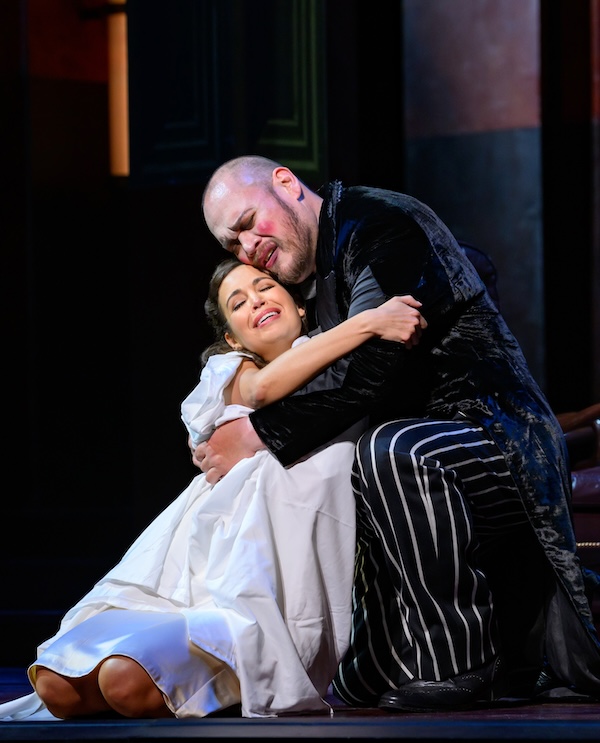
Rigoletto returned to the Metropolitan Opera on Monday evening in Bartlett Sher’s production, which was first seen on New Year’s Eve 2021. The main draw then, as now, was Quinn Kelsey in the title role. He certainly has his fans. When Kelsey appeared on stage during the Preludio, a crack of applause shattered the mood. A pity, as the Met orchestra under the baton of Pier Giorgio Morandi was playing with such expressiveness.
Sher updates the action to Germany during the Weimar Republic, presumably to drive home the point that decadence and malicious behavior are timeless. The updating affords smart military uniforms for the men and glittering gowns for the women of the court. The Duke and his courtiers don long, black leather coats when prowling about town.
Michael Yeargan’s set is a neat, compact revolving cube. The Duke’s palace is conceived in Fascist brutalist style with neoclassical elements and grandeur of scale. By way of contrast, Rigoletto’s modest home is neat and compact, as is Sparafucile’s tavern. The set is a model of efficiency enabling scene changes to take place quickly and quietly.
Sher sticks mainly to the libretto. The most disturbing addition depicts Gilda being prepared by three women for her assignation with the Duke. Their mechanical approach to undressing Gilda indicates its routine business for them. In the final scene, however, Sher goes completely off the rails. Gilda is in the tavern before she knocks on the door and the knife seems to change hands several times, all in a haze of lurid red lights. There’s no way to fathom what Sher was attempting here.
Kelsey has achieved international acclaim for his portray of Rigoletto since he first sang the role in Zurich in 2011. In the ensuing years, he has delved deep into the tortured psyche of the man and revealed it through nuance and detail. This is evident from his first appearance, when without singing a word, he transforms himself from a troubled, haunted wretch into a proud, puffed-up clown, with malice evident in his malicious grin and glaring eyes.
The baritone was in impressive form for this performance. The size and richness of his voice hewn down to deliver insults like the thrust of a rapier, or erupting in rage in “Cortigiani, vil razza dannata,” where he curses the Duke’s men who have abducted his daughter. His baritone’s warmth and beauty, however, was ever present in Rigoletto’s moving duets with Gilda, performed by the radiant Nadine Sierra.
Sierra’s Gilda was a spunky, but innocent teenager. In “Caro nome che il mio cor,” Sierra not only floated beautifully arching phrases and tossed off perfect twills, but also kicked up her legs in sheer delight. Picture a 1940’s bobbysoxer, and you pretty much get the measure of Sierra’s Gilda before fate intervenes.
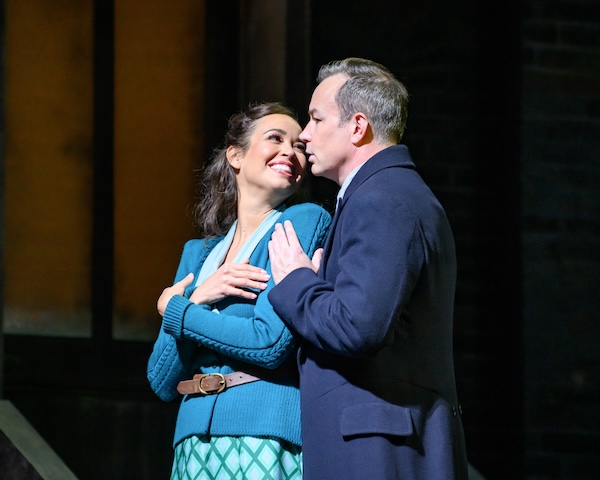
Sierra and Kelsey’s duets, however, formed the emotional arch of the performance. Father and daughter expressed tender devotion in “Figlia!” “Mio padre!” Later, after Gilda had been ravage by the Duke, they gave voice to remorse, fear, and hope with sensitivity and beauty in “Mio padre” Dio mia Gilda!” The father and daughter’s love for one another was evident until the end, even after Rigoletto discovers that Gilda has been the unintended victim of his thirst for revenge upon the Duke.
With his aloof, courtly stiffness, the demeanor of Stephen Costello’s Duke plays against type to a certain degree. His actions are cool and calculated, never overt and unctuous. Costello’s vocal approach to the role is similar. He was in fine form in the first scene mocking his courtiers in a full-voiced “Questa o quella.” His expressions of love for Gilda in “È il sol dell’anima” were as heartfelt as any expressed by father and daughter.
In Act II, however, Costello hit a vocal rough patch in “Ella mi fu rapita! … Parmi veder le lagrime,” in which the Duke expresses his concerns over Gilda’s sudden disappearance. There were sagging phrases and some parched, effortful high notes. The tenor was back in form for the final act, effortlessly tossing off “La donna è mobile.”
With his dark, resonant bass voice and sinister demeanor, Soloman Howard made an impact as Sparafucile. In his first encounter with Kelsey’s Rigoletto, Howard’s assassin for hire left no doubt who was in charge. As his sister Maddalena, J’Nai Bridges was luxury casting with her vocal and physical glamour on full display.
Eve Gigliotti delivered another of her richly detailed performances as Giovanna, Jeongcheol Cha’s Marullo stood out vocally and dramatically among the Duke’s lackeys. In his house debut, Jordan Shanahan’s made for a fiery and vocally commanding Monterone. In “Scorrendo uniti,” the men of the Met chorus sang with gusto and extreme sensitivity to text as they detailed their abduction of Gilda.
Energy and excitement were the hallmark of Morandi’s approach to the score. He sculpted the opening measures from a haunting pianissimo to a terrifying climax with the sound of trumpet, trombones, and cymbals creating a sense of terror and dread. The more tender sentiments of the protagonists were expressed with the same sensitivity by the orchestra, as they were by the singers.
Rigoletto continues through January 24. Erin Morley, Pene Pati, and Luca Salsi assume the principal roles on January 6, 2025. metopera.org
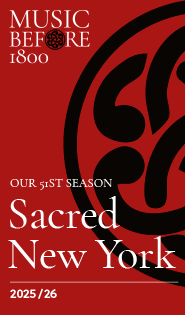
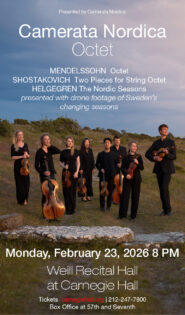
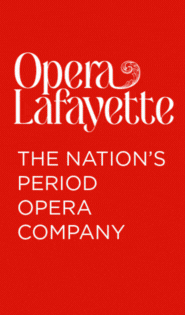


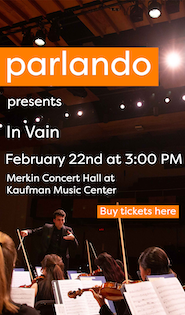
Posted Oct 03, 2024 at 8:59 am by David
Thank you for a review that details the singers. I’m a NYT subscriber, and precious little press is devoted to the singers.
Posted Oct 21, 2024 at 8:11 am by Margaret McCarthy
Oct. 20 Matinee – Fabulous Kelsey, Sierra. Costello good for Act I and then bow out Act II with the flu.
Loved the production